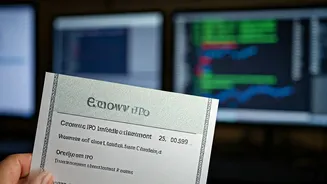IPO Allotment Basics
The process of determining whether you've been allotted shares in an Initial Public Offering (IPO) can be a significant moment for investors. Once the IPO application
period concludes, the company, along with the registrar, begins the allotment process. This process involves evaluating all the applications received and deciding who will be granted shares. The allotment is usually finalized within a week or two following the IPO's closure. You can then check your allotment status through various platforms, and this is generally communicated to applicants via email or SMS. It's important to keep track of the key dates related to the IPO, like the closing date, the allotment date, and the listing date on stock exchanges. Knowing these dates helps you stay informed and manage your expectations during the IPO journey.
Checking Online Options
Several online platforms offer convenient methods to check your Groww IPO allotment status. One of the primary places to start is the official website of the registrar for the IPO. The registrar is responsible for managing the application process and the allotment. You'll usually find an IPO allotment status section on their website where you can enter details like your application number, PAN card number, or Demat account number to check the status. Additionally, you can check through the websites of the stock exchanges, such as the BSE (Bombay Stock Exchange) or the NSE (National Stock Exchange). These platforms often provide a search tool where you can input your details to find out if you've been allotted the shares. Other financial websites and brokers may also provide this information, so it's worth checking the portals you usually use for your investments. These platforms simplify the process of checking and ensure you receive updates without hassles.
Required Information
To accurately check your Groww IPO allotment status, you'll need a few essential pieces of information ready. First and foremost, you will require your application number. This unique number is assigned to your IPO application, and it helps identify your specific submission. Your PAN (Permanent Account Number) is another vital piece of information. The registrar uses this to verify your identity and link your application. Also, have your Demat account details at hand. Your Demat account holds your shares if they are allotted. The details, such as the DP ID and client ID, may be required on some platforms. Lastly, ensure that you have your date of birth, as this is sometimes needed to authenticate your identity. Gathering all these details beforehand ensures a smooth and efficient checking experience. Be certain to double-check the accuracy of the information before submitting it on any platform to avoid issues.
Understanding Allotment Results
When you check your allotment status, you might encounter various outcomes. If your application is successful, you will see a message confirming the allotment of shares. This indicates that you have been granted shares in the IPO, and they will be credited to your Demat account. In contrast, if your application is unsuccessful, you will not receive shares. The reason for the rejection is often not specified. It could be due to factors such as insufficient demand, not meeting eligibility criteria, or technical issues. In some cases, partial allotments may occur. This is where you might receive fewer shares than applied for, owing to the high demand for the IPO. Once the allotment is complete, the shares will be listed on the stock exchanges, at which point you can trade them. If you don't receive an allotment, the funds blocked for the IPO will be released back to your account.
Post-Allotment Actions
After finding out your Groww IPO allotment status, certain steps must be taken, depending on whether you received shares. If your application was successful and you have been allotted shares, keep an eye on your Demat account. The shares will be credited to your account, usually within a few days of the allotment date. Once the shares are credited, you are free to trade them on the stock exchanges. If you didn't receive shares, the funds blocked for the IPO will be released back to your account. This process usually happens automatically, and you should receive the funds within a week or two. In the event of any discrepancies, like funds not being released, or shares not being credited, contact your broker or the registrar. Save all relevant documents and records, like application confirmations and allotment notices, to handle any potential issues or disputes effectively.
















